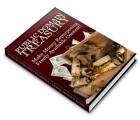
 License Type: Private Label Rights
License Type: Private Label Rights  File Type: ZIP
File Type: ZIP
 SKU: 64650
SKU: 64650  Shipping: Online Download
Shipping: Online Download
Sample Content Preview
Introduction
Whether you are married or single, taking charge of your overall finances may feel like a part-time job. Some easy ideas can help you streamline your time, organize your finances, and reduce the stress of debt and overall money matters.
Debt Management
Chapter 1:
Keep all your Papers Fully Organized
Synopsis
When the mail arrives, make certain it goes in one place. Lost bills can be the cause of uninvited late fees and may damage your credit rating. Whether it’s a drawer, a box, or a file, be ordered and make certain other people in the household do the same. Size is likewise important. If you get a lot of mail, utilize an area that won’t get filled up too fast.
Make It Neat
Your bills come every month whether you wish them to or not. Setting them in a cubby hole somewhere and dealing with them later may lead you to draw a blank about their maturity date. When this occurs you wind up being forced to pay a late fee. If you're willing to get organized, you are able to get your bills paid on time and never have to fret about incurring a late fee. This might take a little bit of time to set up, but only a couple of extra minutes per week to sustain.
Make sure you open your bills. A lot of bills come with unneeded inserts that just take up room in the place where you store your bills. Take out any inserts and recycle them with the outer envelope at once. This keeps clutter from stacking up and taking your focus off of the bill itself. Now take the bill and put it under the fold of the return envelope.
You are able to label 4 plastic bins so that each one makes up a week of the month. You are able to simply label them "Week 1," "Week 2," "Week 3," and "Week 4." Now take your prepared bills and find out the maturity date. If the maturity date is the 8th of the month, the bill goes in the week 2 bin. If the maturity date is the twentieth, the bill goes in the bin for week 3.
Do this with all of your bills and then place the bins on top of one another in order. When week 1 rolls around, take your bills out and pay them. Then put the bin on the bottom of the pile so that the week 2 bills are ready for you the next week.
Finally once your bills are paid, you nevertheless have your financial statements to deal with. You want to keep them coordinated as well so that you are able to quickly locate them if you need to.
Buy a thirteen pocket file folder. Mark the first twelve pockets with the calendar months of the year. The last pocket can be marked "taxes." Place your monthly financial statements into the pocket for that certain month.
When the year is complete, you are able to label the file folder with the year on the front and store it just in case you ever get audited.
Chapter 2:
Learn Money Management Tactics to Stay on Schedule
Synopsis
Bill paying may be simplified if it’s done at scheduled times during the month as we discussed. Depending upon how many bills you get, you are able to establish set times monthly so none of your bills will be late. If you’re paying bills as you receive them, chances are you’re spending a bit much time in front of the checkbook. Although bills might say “Payable Upon Receipt”, there’s always a grace period. Call the creditor to discover when they need to get payment before the bill is considered late and use these tips.
Keep Up
Wouldn’t matters just be more comfortable if everybody had an accountant to handle all the financial matters in his life? For those who can not afford to maintain an accountant on retainer, you need to answer as your own accountant and discover how to supervise your money, where it goes, and what it’s for.
Here are a few ideas to help you if you’re a tad bit uncertain how to go about addressing the money matters.







